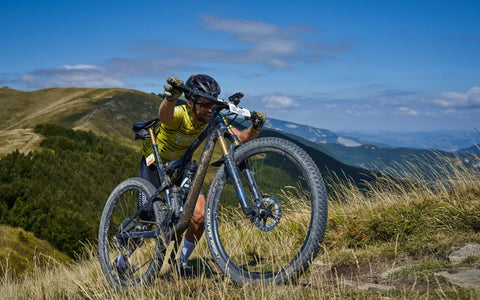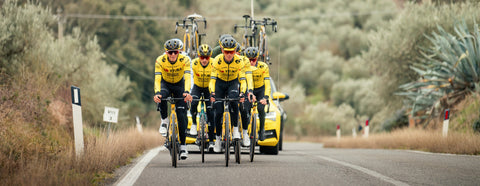Written by: Juul van Loon
Lanzarote entices with its breathtaking white cottages, the deep blue sea, and a unique lava stone landscape. It's a destination that you definitely need to visit at least once in your lifetime. The island offers great cycling opportunities, though the options can be somewhat limited due to the frequently occurring wind, the sometimes monotonous perfect roads, and the relatively small size of the island. Nonetheless, the 4 Stage MTB Lanzarote, a four-day mountain bike competition held at the end of January, never loses its appeal. This event is the perfect preparation for a new marathon season on the mountain bike, both for your fitness and for fine-tuning your nutrition strategy.
A Personal Strategy (Chocolate Spread!)
This winter marks my fourth participation in a demanding mountain bike competition, but this time with a renewed focus. For the first time, I will be participating in the Cape Epic in March, also known as the 'Tour de France' for mountain bikers. This challenging race means I'm taking my preparations in Lanzarote even more seriously. An important part of this preparation is a structured approach to my sports nutrition. Unlike a few years ago, when my post-training meals often consisted of white bread with butter and a generous layer of chocolate spread, leading to me returning from the Canary Island a kilo heavier, I now choose a more thoughtful nutrition strategy. This not only helps me to arrive at the start in optimal condition but also supports my ambition to put in an impressive performance during the Cape Epic.
Optimized Nutrition Strategy
My post-training meals are now much healthier, although white bread for breakfast - now only topped with jam in various flavors - remains a staple. This ensures I consume about 250-300 grams of carbohydrates about three hours before the start, a tactic I've been applying for years. A significant improvement I've made is in my nutrition approach during mountain biking: where I used to randomly take one gel per race hour, I now carefully plan to take at least two, often even three gels with a well-thought-out carbohydrate mix. This strategy has likely contributed the most to my performance improvements, allowing me to compete for a top 10 spot once again.
Turbo Gels Key to Success
Turbo Gels are my secret weapon: with and without caffeine, each good for 40 grams of carbohydrates in an optimal 1:0.8 glucose-fructose ratio. This helps me consume more than 90 grams of sugars per hour during tough stages. Due to my tendency to drink too little, I consciously choose Energy Drink in my bidon, mixed with about 20 grams of sugar. This choice makes my hydration more flexible and prevents feeling bloated from drinking too quickly. Thus, I maintain optimal performance without compromise.
Navigating Challenging Trails
The course of the 4 Stage MTB Race in Lanzarote is a true challenge: full of echelons, loose sand, and technically difficult trails that offer few moments of rest. Therefore, I adjust my nutrition strategy and leave the Energy Fruit Chew at home. Instead, I fill my back pocket with two Turbo Gels for each expected hour of racing, plus two extra for safety. I start my preparation before the race with a gel three-quarters and a quarter of an hour before the start, including one with caffeine, following my 1:0.8 nutrition plan for optimal stomach absorption.
Once on the way, I take a gel about every 25 minutes, aiming for an intake of around 110 grams of carbohydrates per hour. It's important not to skip the first 25 minutes, but also to be flexible with timing, depending on the course and race progress. Keeping track of your consumption can also be a welcome distraction. This way, you stay on track for the best performance overall.
Strategies for the Climbing Time Trial
After each stage of the race, I evaluate my nutrition strategy: I count the gels taken and assess my fluid intake, which invariably turns out to be too low. Nevertheless, I manage to consume well over 100 grams of carbohydrates per day. Even during the queen stage, the most challenging stage, I successfully adjust my strategy by switching to water after two hours and slightly increasing the frequency of gel intake.
The climbing time trial, with its unique demands, calls for a tailored approach. At the point where the course briefly descends, I consciously choose to take just one drink gel. This focused choice optimally supports my performance without disrupting my rhythm. Thus, I navigate through the challenges of the race, always searching for the perfect balance between energy and hydration.
This gives me confidence for the Cape Epic. Along the way, things go well. In the second stage, I even lead for a while, mostly following in the wheel of the Spanish classification leader, Ismael Ventura. He hasn't got his nutrition plan quite right, as he asks for a drink. After letting him sip from my bidon, unfortunately, I can no longer keep up




